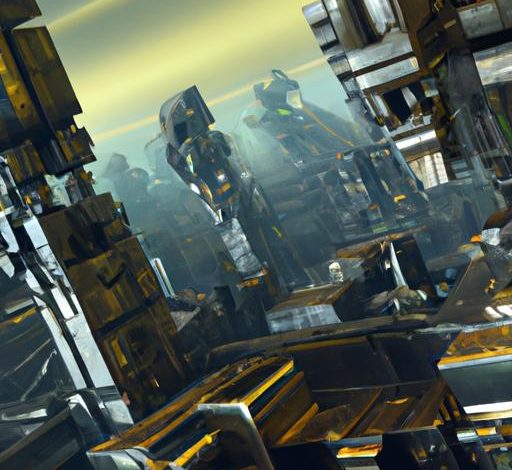Is Hunger Games Sci-Fi? Exploring the Genre of the Captivating Series

The Hunger Games series has captured the hearts and minds of millions, immersing readers and viewers in a thrilling dystopian world. But amidst the excitement, a crucial question arises: is Hunger Games truly science fiction? In this article, we will delve into the essence of science fiction, introduce you to the captivating Hunger Games series, and explore the ongoing debate surrounding its classification within the sci-fi genre.
A. Definition of Science Fiction (Sci-Fi)
Before we dive into the Hunger Games, let’s establish a clear understanding of science fiction. Sci-fi is a genre that combines elements of science and technology with imaginative storytelling. It often explores futuristic concepts, advanced technology, and speculative ideas that push the boundaries of our current understanding. But does the Hunger Games fit this mold?
B. Introduction to the Hunger Games series
The Hunger Games, penned by Suzanne Collins, takes place in a totalitarian society known as Panem. Divided into districts and ruled by the Capitol, the series follows the journey of Katniss Everdeen as she battles for survival in the eponymous Hunger Games. This annual event forces children from each district to fight to the death, all for the entertainment of the Capitol’s citizens. The series gained immense popularity through its books and subsequent film adaptations, captivating audiences worldwide with its gripping narrative and unforgettable characters.
C. Overview of the debate: Is Hunger Games sci-fi or not?
The debate surrounding the classification of the Hunger Games as science fiction has sparked numerous discussions among fans and literary enthusiasts. While some argue that the series primarily falls within the dystopian or adventure genre, others contend that it undeniably features essential sci-fi elements. To unravel this mystery, we must closely examine various aspects of the Hunger Games, including its futuristic setting, incorporation of advanced technology, and portrayal of a dystopian society.
Join me on this captivating journey as we explore the captivating world of the Hunger Games and determine whether it rightfully belongs in the realm of science fiction. Are you ready to unravel the enigma behind the genre classification? Let’s dive in!
Analyzing the Elements of Science Fiction

A. Exploration of Futuristic Settings in the Hunger Games
One of the key elements of science fiction is the creation of futuristic settings that transport readers into a world beyond our present reality. In the Hunger Games series, Suzanne Collins masterfully constructs the nation of Panem, a post-apocalyptic North America. Divided into districts and ruled by the technologically advanced Capitol, Panem presents a captivating vision of a society shaped by the aftermath of war and oppression. The vivid descriptions of the Capitol’s opulence and the stark contrast with the impoverished districts immerse readers in a world that feels both familiar and yet tantalizingly distant.
B. Examination of Advanced Technology and Its Role in the Story
Science fiction often incorporates advanced technology as a central component of the narrative, and the Hunger Games series is no exception. Collins weaves a tale where futuristic advancements play a crucial role in shaping the story. From the high-tech weaponry used in the arena during the Games to the surveillance systems that monitor the districts, technology is an ever-present force that influences the characters’ lives. The integration of hovercrafts, force fields, and genetically modified creatures adds an extra layer of intrigue, showcasing the imaginative and speculative nature of the series.
C. Discussion of Dystopian Society and Its Portrayal in the Series
Dystopian societies are a common theme within the science fiction genre, and the Hunger Games series delves deep into this realm. Panem’s society is marked by extreme social inequality, oppressive rule, and the exploitation of its citizens. The Hunger Games themselves, wherein children are forced to fight to the death for entertainment, highlight the disturbing aspects of this dystopian reality. Collins skillfully uses this setting to explore themes of power, rebellion, and the resilience of the human spirit. The portrayal of a dark and oppressive society is a hallmark of science fiction, further solidifying the argument for the inclusion of the Hunger Games within the genre.
As we unravel the elements that comprise the Hunger Games series, the presence of futuristic settings, advanced technology, and a dystopian society becomes increasingly apparent. These essential components firmly position the series within the realm of science fiction. Join me in the following sections as we compare the Hunger Games with other sci-fi works and delve deeper into the role of science and technology within its narrative. Prepare to be captivated by the enthralling world of Panem!
Comparison with Other Science Fiction Works

A. Similarities between Hunger Games and Established Sci-Fi Novels
When evaluating the classification of the Hunger Games as science fiction, it is crucial to compare it with other renowned works within the genre. Surprisingly, the Hunger Games bears striking resemblances to several established sci-fi novels. Just like in works such as “1984” by George Orwell and “Brave New World” by Aldous Huxley, the Hunger Games presents a dystopian society ruled by a totalitarian regime. This shared theme of oppressive governments and the struggle for freedom serves as a common thread among these influential works, solidifying the Hunger Games’ place within the science fiction genre.
B. Speculative Elements in the Hunger Games Series
Science fiction often incorporates speculative elements that challenge our current understanding of the world. In the Hunger Games, we witness the introduction of advanced technology, genetically modified creatures, and futuristic weaponry. These speculative elements transport us to a world where scientific advancements have reshaped society, blurring the line between reality and fiction. The inclusion of these imaginative concepts further strengthens the argument for the Hunger Games’ classification as a work of science fiction.
C. Utilization of Scientific Principles in the Narrative
In addition to speculative elements, the Hunger Games also utilizes scientific principles or concepts to drive its narrative. From genetic modification and biotechnology to surveillance systems and advanced weaponry, the series taps into scientific advancements to create a plausible and immersive world. By grounding the story in scientific principles, the Hunger Games not only entertains but also prompts readers to contemplate the potential consequences of unchecked technological progress. This integration of scientific concepts reinforces the notion that the Hunger Games should indeed be considered a work of science fiction.
As we delve deeper into the Hunger Games series, we uncover more evidence supporting its classification within the science fiction genre. The similarities with established sci-fi novels, the presence of speculative elements, and the utilization of scientific principles all contribute to the rich tapestry of this captivating series. Stay with me as we explore the role of science and technology within the Hunger Games universe.
The Role of Science and Technology in the Hunger Games
A. Investigating the significance of scientific advancements in the story
Within the Hunger Games series, scientific advancements play a pivotal role in shaping the narrative. From the advanced weaponry to the intricate arena designs, the story is teeming with technological marvels that captivate both the characters and readers alike. These scientific innovations contribute to the intensity and suspense that permeate the Games, amplifying the stakes and showcasing the immense power wielded by the Capitol.
B. Exploring the use of technology for surveillance and control
One of the most striking aspects of the Hunger Games is its portrayal of a dystopian society where surveillance and control reign supreme. The Capitol utilizes advanced technology to monitor and manipulate not only the tributes but also the citizens of Panem. From the tracking devices implanted in the tributes’ arms to the omnipresent cameras capturing their every move, technology becomes a tool of oppression, highlighting the dark side of scientific progress.
C. Discussing the impact of genetic modification and biotechnology in the series
In the Hunger Games, genetic modification and biotechnology emerge as crucial elements that shape the world and the characters within it. The Capitol’s creation of muttations, genetically engineered creatures, adds an eerie and unpredictable element to the Games. These grotesque hybrids not only pose physical threats but also serve as a chilling reminder of the Capitol’s control over life itself. Additionally, the series explores the ethical implications of genetic engineering, raising questions about the boundaries of science and the consequences of tampering with nature.
As we delve deeper into the role of science and technology within the Hunger Games, we uncover a world where scientific advancements are both awe-inspiring and terrifying. The interplay between innovation, surveillance, and genetic manipulation adds layers of complexity to the narrative, while also serving as a cautionary tale about the potential dangers of unchecked scientific progress. Join me as we continue our exploration of this captivating series and unravel the intricate web of science and technology woven within its pages.
Conclusion
In conclusion, the Hunger Games series presents a captivating blend of elements that make it a unique and thought-provoking work of literature. While the debate on whether it qualifies as science fiction continues, it is evident that the series incorporates significant sci-fi elements that contribute to its overall appeal.
Throughout the series, themes of power, oppression, and resistance are explored in great depth. The oppressive regime of the Capitol and the resistance movements led by characters like Katniss Everdeen shed light on the complexities of societal power dynamics. The Hunger Games also serves as a social commentary on reality television and media manipulation, highlighting the dangers of voyeurism and the control exerted through the media. It forces us to question the ethical implications of turning violence into entertainment.
Moreover, the series delves into ethical dilemmas and the true nature of humanity. It challenges readers to examine their own values and consider the consequences of their actions. The characters’ choices in the face of adversity reflect the timeless struggle between right and wrong, showcasing the inherent complexities of human nature.
In conclusion, the Hunger Games series, with its futuristic setting, advanced technology, and exploration of dystopian society, undoubtedly contains substantial elements of science fiction. It successfully combines thrilling action with social commentary, offering readers and viewers a thought-provoking experience that resonates long after the final page is turned or the credits roll.
As Game Hoy, we invite you to immerse yourself in the enthralling world of the Hunger Games and join the ongoing discourse on its genre classification. Are you ready to embark on an adventure that blurs the lines between reality and fiction? Remember, “May the odds be ever in your favor.”
Conclusion: So above is the Is Hunger Games Sci-Fi? Exploring the Genre of the Captivating Series article. Hopefully with this article you can help you in life, always follow and read our good articles on the website: Game Hoy



